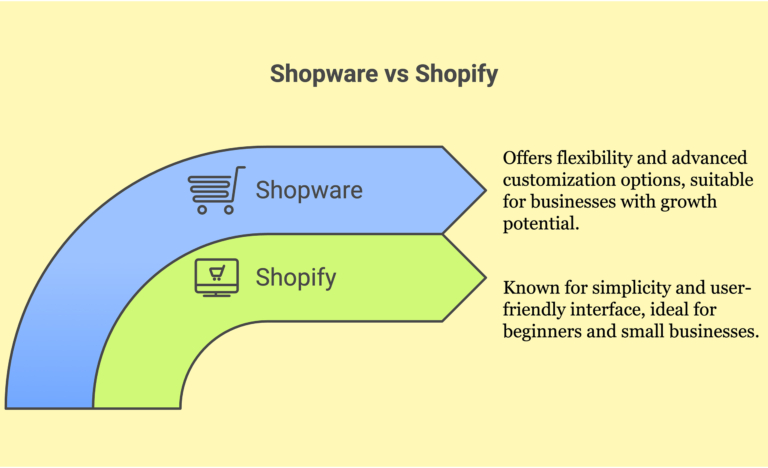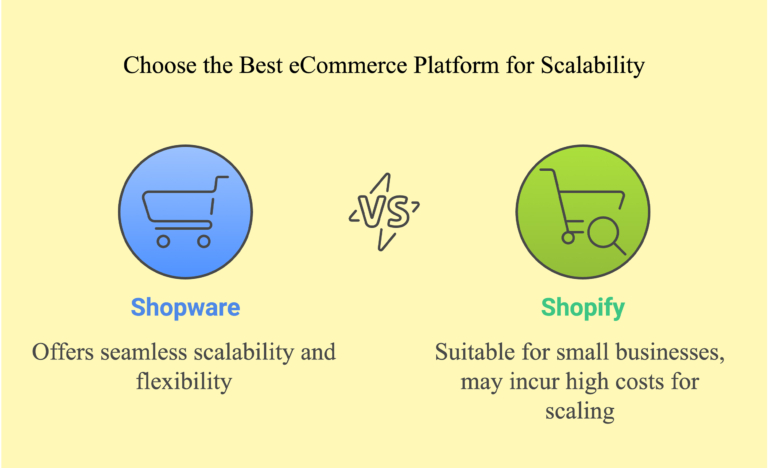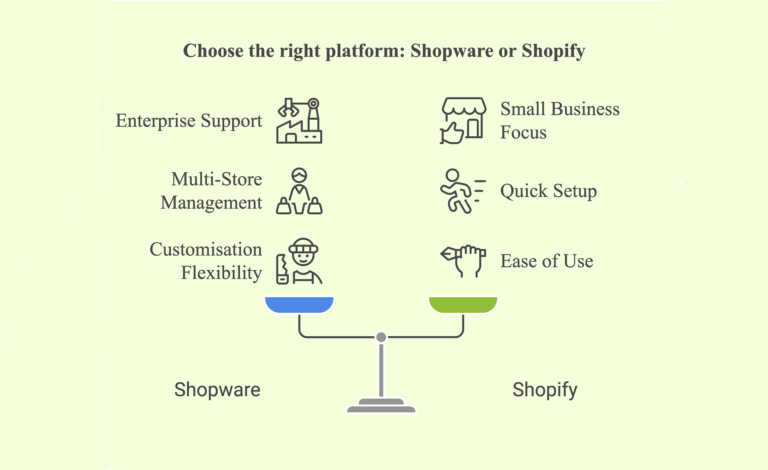Greetings! I'm Aneesh Sreedharan, CEO of 2Hats Logic Solutions. At 2Hats Logic Solutions, we are dedicated to providing technical expertise and resolving your concerns in the world of technology. Our blog page serves as a resource where we share insights and experiences, offering valuable perspectives on your queries.

- Shopware and Shopify are leading e-commerce platforms designed for different business needs in 2025.
- Shopify is built for simplicity, making it the go-to choice for beginners starting their first online store.
- Shopware gives you complete control over your store’s design and functionality through its open-source nature.
- Large businesses with unique requirements will find Shopware’s flexibility matches their complex needs.
- Shopify’s pricing model includes monthly subscriptions and transaction fees unless using Shopify Payments.
- While Shopware costs more to develop initially, it saves money long-term by avoiding transaction fees.
If you are confused about Shopware vs. Shopify, you have landed on the right page. Choosing the right one for your website can be overwhelming. This decision will have a direct impact on your performance and long-term success.
This article will explore two leading e-commerce platforms, Shopware and Shopify. By the end of this guide, you’ll have a clear understanding of which platform aligns best with your business goals.

Overview: Shopware vs Shopify
Shopware and Shopify are two leading eCommerce platforms, each catering to different business needs. Shopify is renowned for its simplicity, offering an intuitive setup and user-friendly interface. This makes it an excellent choice for beginners and small businesses.
On the other hand, Shopware stands out for its flexibility and providing advanced customization options and robust features. Both platforms help to build online stores. However, they differ in their approach to usability and growth potential.
Feature Comparison: Shopware vs Shopify
To know the platforms in-depth, take a look at the features of both platforms.
Customization Options
Shopware 6 is open-source in nature. It provides advanced flexibility for customisation. Businesses can modify every aspect of their online store. The design you want or any functionality you require can be done without the constraints of a closed system.
In contrast, Shopify offers a more streamlined approach with limited customisation options. Until you get into custom coding, it will be less adaptable for businesses looking for intricate changes.
Flexibility for Growth
Shopware is ideal for larger businesses with complex e-commerce needs, offering scalability and advanced customizations. Shopify works well for smaller businesses but may become costly and less flexible as the business grows.

Comparing the growth capabilities of Shopware and Shopify.
Costs and Fees
Shopware offers flexibility with both a free open-source edition and paid editions. When it comes to customization it may require higher developmental costs.
Its open-source nature can provide cost-effective solutions in the long run. Businesses opting for Shopware’s paid plans must also account for monthly subscription fees.
Shopify follows a clear subscription-based pricing model, including monthly fees. There are additional costs for plugins and apps.
Extensions & Apps
Shopware has an open plugin system with custom module development and third-party integrations. The community contributes extensions that can be readily integrated into your store. This provides flexibility in adding new functionalities based on specific business needs.
Shopify offers an extensive app marketplace with third-party integrations. It helps to ensure reliability and quick installation. However, the options are limited to what’s available in their marketplace.

Extension availability in Shopware and Shopify
Marketing & SEO Features
Shopware provides advanced SEO capabilities with control over optimization elements. Its flexible content management system allows for custom marketing tool integration and multi-channel selling features.
Shopify offers built-in SEO tools and integrated marketing features. This helps to make the process streamlined. However, customization options are more limited compared to Shopware’s flexible system.
Support
Shopware has official support channels. It has clear documentation and resources to support the community. It has detailed installation guides, API documentation, developer guides, etc.
Check out the Shopware Help Centre for troubleshooting and a step-by-step process.
Shopify has 24/7 support coverage for customer service. It has multiple support channels for live chat, email support, phone, and social media support. For further resources, it has a help centre, step-by-step tutorials, video guides, and extensive documentation.
Key Differences: Shopware and Shopify Support
To understand in depth, take a look at the key differences in support between Shopware and Shopify.
| Key Differences | Shopify | Shopware |
| Availability | 24/7 support across all plans | Support varies by editions |
| Response Time | Immediate support through live chat | Response time depends on the edition and support package |
| Support Scope | General platform support, limited help with technical customizations | In-depth technical support, especially for enterprise clients |
| Self-Help Resources | Extensive documentation, beginner-friendly | Extensive documentation, more technical and developer-focused |
Technical Implementation
Shopware requires significant technical expertise for implementation and maintenance. The platform offers extensive development capabilities for complex customisations and integrations. This technical depth enables businesses to create highly specialised solutions.
In comparison, Shopify provides a more straightforward implementation process with minimal technical requirements. While this makes it easier to get started, it also means less flexibility for complex technical implementations.
Use Cases: When to Choose Shopware or Shopify
Let’s understand in which cases you should go with Shopware and Shopify.
When to Choose Shopware:
- Businesses with Unique Needs: If your online store requires customisations and specific workflows. Also, if you have a complex range of product structures, specialised payment options, or unique integrations, Shopware can be fully customised to fit those needs.
- Multi-Store Setups: With Shopware, you can create and manage multiple stores. This makes it easier to manage various brands in a single system.
- Enterprise-Level eCommerce: Shopware helps with large-scale operations and handling complex product catalogues. This can aid global expansion and high-volume transactions.

Key Features of Shopware and Shopify to Help You Decide
When to Choose Shopify
Shopify is ideal for businesses seeking a straightforward and easy-to-use platform. It is well-suited for smaller to medium-sized stores that do not require extensive customisation.
Shopify’s simplicity makes it a great choice for entrepreneurs. This is also good for those new to eCommerce who need to quickly set up a store with minimal hassle.
Why Shopware is the Smarter Choice
Shopware supports business with long-term effects in mind. This open-source nature makes it ideal for flexibility and customisation. This helps businesses adapt their online store to different new trends.
Customization helps to handle complex requirements. You can do custom workflows for unique product configurations without compromising on performance.
Shopware supports the integration of ERP, CRM, or other third-party systems. The features make it easy to connect and automate business processes. Its modular architecture means businesses can expand functionality as needed.
Take a look at the reasons why you should migrate from Shopify to Shopware.
Looking to bring your unique e-commerce vision to life? Let’s explore how Shopware Agency can align with your business goals and growth plans. At 2Hatslogic, we love collaborating with businesses to understand their needs and create online stores that truly reflect their brand.
FAQ
Which platform is easier to set up if I'm new to e-commerce?
Shopify is the easier choice for beginners since it offers an intuitive setup process and a user-friendly interface. You can launch your store quickly without any technical expertise.
Will I save money using Shopware or Shopify?
Shopify has clear monthly subscription fees but charges additional transaction fees unless you use Shopify Payments. Shopware has higher upfront development costs but no ongoing transaction fees, making it more cost-effective in the long run for high-volume stores.
Can I customize my store's design and features exactly how I want?
Shopware offers complete customization of every aspect of your store since it's open-source. Shopify has more limited customization options unless you're willing to dive into custom coding.
Which platform is better for a growing business?
Shopware is better for growing businesses because it can handle complex needs like multiple storefronts and large product catalogs without requiring you to switch platforms. Shopify may require upgrading to enterprise-level solutions as your business grows.

Related Articles






